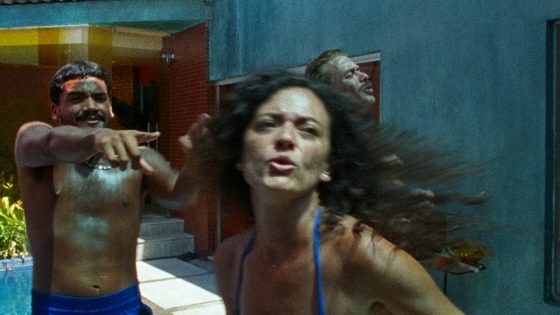Kleber Mendonça Filho’s “Rivers of Dust,” Anna Muyleart’s “Geni and the Zeppelin” and “Pearl Motel,” fromJorge Furtado, feature among potential nine brand new projects announced at the Cannes Festival by Globo Filmes, the theatrical film co-production arm of Brazilian TV giant Globo.
With Mendonça Filho deep in pre-production on political thriller “The Secret Agent,” co-produced by France’s MK Productions, details on “Rivers of Dust,” save that he will re-team on it with Juliano Dornelles after their 2019 Cannes Jury Prize winner “Bacurau.”
Elsewhere, the new projects speak volumes of Globo Filmes’ current content focus. There’s the broad spectrum. . Titles straddle commercial plays – gay espionage operatives comedy “Special Agents” from Pedro Antônio – “A” list festival plays such as “Rivers” and Geni” and cross-over titles such as sex-laced situation comedy “Pearl Motel.”
Above all, additions to Globo Filmes’ development slate underscore two of its biggest investment priorities.
One is diversity. “We are looking for more female, Black and indigenous filmmakers and cineastes from outside Rio de Janeiro and São Paulo,” says Oliveira. “In Brazil, we have a mix of cultures. We are a continent. We have to show it all.”
Caio Gullane of “Destiny Motel” producer Gullane agrees: “Brazil is today a country that is widely and openly discussing inclusion in its audiovisual sector. TV Globo and Globo Filmes are leaders in this movement.”
“Geni and the Zeppelin” marks Globo Filmes’ second current feature from Muylaert, whose 2015 Sundance Grand Jury Prize winner “The Second Mother” heralded Globo Filmes’ building embrace of an exciting younger generation of female directors. Other new helmers on the Globo Filmes’ slate include Berlin 2024 Encounters best director winner Juliana Rojas for “Cidade: Campo” and Carolina Markowicz whose SXSW hit “Toll” has scored a 100% Rotten Tomatoes score off 18 reviews.
“Geni,” the story of a heart-of-gold riverside sex worker who saves her town from a foreign invader but is still repudiated by her townsfolk, “Geni” turns on prejudice, like “Toll” and another new project, Silvio Guindane’s “Crisalida,” Guindane’s drama is about an elderly white reactionary widower whose diehard worldview melts when he’s forced to take care of his granddaughter Ana, a joyful and curious Black child.
The other Globo Filmes priority is social relevance. To that end, projects in development include Camilo Tavares’ “Internal Enemy” which produces proof of the torture and murder of civilians opposed to Brazil’s military dictatorship; Vinicius Reis’ “Refestança,” an eye-witness account of Rita Lee and Gilberto Gil’s 1977 freedom-pushing concert tour.
“Childhood, from Maria Augusta Ramos’ (“The Trial”) contrasts education available in two very different parts of Brazil. Directed by Berlin winner Eliza Capai (“Your Turn”), “Severinas” revisits once dirt-poor Guaribas, recording the recent transformation of women’s lives.
Recent Globo Filmes Releases in Brazil:
“Astral City 2,” (“Nosso Lar 2 – Os Mensageiros,” Wagner de Assis, Cinética Filmes)
The sequel to 2010 spiritual blockbuster, produced once more by Iafa Britz for 20th Century Studios , Star Original Productions and Cinética, and released by Disney’s Star Distribution. André Luiz returns again from the Astral City, this time round to save three protégés about to fail.
“The Beachnickers 2,” (“Os Farofeiros 2,” Roberto Santucci)
Santucci, Brazil’s box office king over 2010-16, thanks to “Head Over Heels” and “Til Luck Do Us Part,” back with his regular scribe Paulo Cursino and a sequel to the 2018 comedy hit. Here the four workmates score a free dream vacation to Bahia with their families. It can only go wrong.
“My Sister and Me,” (Susana Garcia, Paris Entretenimiento)
Bowing Jan 4, hitting a post-pandemic record of 2.2 million admissions. Reuniting Ingrid Guimarães and Tatá Werneck, stars of 2012’s “Head Over Heels” 2, a blockbuster comedy in Brazil, co-produced with Paris Filmes and directed by Garcia, a comedy specialist (“My Mom is a Character”).
My Sister and I
Ellen Soares
“Toll,” (Carolina Markowicz, Biônica Filmes)
After 2018 Cannes Queer Palm winning short “Orphan,” and Toronto Platform debut feature “Charcoal,” the second feature from a leading light of Brazil’s new generation which won best film at Rome, a complex mother-son relationship drama with mum turning to crime to financé her happily gay son’s conversion therapy. A vision of Brazilian bigotry, treated with a light touch, the critical consensus ran.
Upcoming Releases
“Abah and His Band,” (“Aba ye sua banda,” Humberto Avelar, Fraiha Produçoes)
A kids animated adventure feature set up at Fraiha, behind smash hit “Vai Que Dá Certo” and “Veronica,” in which young Ana, who wants to be a rock-and-roll musician not a king, discovers his evil uncle’s designs to end diversity in the kingdom.
“The Business Women’s Club,” (“O Club dar Mulheres de Negócio, Anna Muylaert, Glaz Entertainment, Africa Filmes)
Unveiled at 2021’s Cannes, from Muylaert, director of “The Second Mother,” which won a 2015 Sundance Grand Jury Prize and a Berlin Panorama Audience Award, and notched up fulsome sales for the Match Factory. Set in an alternate Brazil where gender stereotypes are flipped, The movie channels Muylaert’s keen sense of social dynamics in a comedic take on sexism. At a Country Club for powerful businesswomen, three jaguars escape from their enclosure sparking what is described as “a game of denial, lies and attacks that end up badly.”

The Business Women’s Club
Credit: Aline Arruda
“Childhood,” (“Infância,” Maria Augusta Ramos, Comova Filmes, Nofoco Filmes)
A study of the education – as well as their intimate lives with family, friends, the street, and play – of two children in very different parts of Brazil. Directed by Ramos, behind doc feature “The Trial,” a third prize Audience Award winner at the Berlinale’s 2018 Panorama.
“Cidade; Campo,” (Juliana Rojas, Dezenove Films)
Rojas’ fourth feature and second solo outing after Cannes 2011’s “Hard Labor” and 2017 Locarno Special Jury Prize winner “Good Manners,” which established her as one of Brazil’s preeminent genre auteurs, a diptych relocation tale and “existentialist supernatural film,” talking about connections with ancestry and reinvention, Rojas told Variety.

Cidade Campo
“Crisalida,” (Silvio Guindane, Visión, A Fábrica)
Cássio, an elderly white reactionary widower sees his worldview change when he’s forced to take care of his granddaughter Ana, a joyful and curious Black child.
“Destiny Motel,” (“Motel Destino,”Karim Aïnouz, Cinema Inflamável, Gullane)
The latest from Brazil’s most international director, world premiering in Cannes main competition, an erotic thriller, with Dayana, the young wife of a roadside sex hotel owner seducing on-the-run Heraldo for great sex. If he can help her kill her terrifyingly abusive older husband, all the better.
“DPA – The Missing Scepter,” (“Detetives do Prédio Azul – O Sumiço do Cetro Supremo,” Mauro Lima, Conspiraçao)
Next movie installment in Globo’s long-running film/series kids fantasy adventure franchise, from major Brazilian studio Conspiraçao. (“The Invisible Woman,” “The House of Sand,” “Under Pressure”)
“Fuse,” (“Estopim,” Rebeca Diniz, Pedro Waddington, Conspiraçao Filmes)
Returning from a party, two affluent teens set a homeless woman on fire, killing her. Will their privileged parents shield them by concealing the truth? The anticipated big-screen makeover of Herman Koch’s bestseller “The Dinner,” from Diniz and Pedro Waddington, both directors on “Under Pressure.” Rated Globoplay TV series writer Sergio Goldenberg (“Land of the Strong,” “Iron Island”) writes.
“Geni and the Zeppelin,” (“Geni e o Zepelim,” Anna Muylaert, Migdal Filmes)
Muylaert, adapts a Chico Buarque song about Geni, a young riverside sex worker denigrated for giving herself to the homeless and emigrants whose village will be destroyed by a Zeppelin unless she spends a night with its hideous commander.
“Great Sertão,” (Guel Arraes, Paranoid Filmes)
Conflict escalates into real war between organized crime and police in a huge slum on the outskirts of a city. Narrated by Riobaldo, a rehabilitated criminal, inspired by the novel of Guimarães Rosa, the latest from Arraes, whose career is inextricably linked to Globo as a telenovela director, helmer of 200o’s “A Dog’s Will,” which set a gold standard for Globo Filmes’ titles, and as

Great Sertao
Helena Barreto
“Internal Enemy,” (“Inimigo Interno,” Camilo Tavares, Nexo Filmes)
From Tavares (“The Day That Lasted 21 Years,” “O Grande Irmão”), another investigative doc feature tapping confidential White House and Brazilian government documents to reproduce what are described as “cold terrifying state agents declarations, jurists and victims on torture and death of civilians who opposed dictatorship.”
“Leo’s Party,” (“A Festa de Léo,” Gustavo Melo and Luciana Bezerra, Coqueirão Pictures)
From Melo and Bezerra, part of a generation of talent formed at the Rio Vidigal favela theater group Nos do Morro, Rita races against time to find the money for her son Leo’s party and his father Dudu’s debts, which could cost him his life.
“Macunaíma XXI,” (Felipe Bragança, Zahy Tentehar, Duas Mariola Filmes)
One of the big international titles on Globo’s slate, a contemporary road movie reimagining of Mario de Abdrade’s celebrated novel mixing indigenous heritage and big poor city outskirts. Bragança, whose “Don’t Swallow My Heart, Alligator Girl!” played Sundance and Berlin in 2017, directs with Indigenous artist-activist Tentehar. Produced by Duas Mariola. France’s Promenade Films co-produces.
“Mundurukânia,” (Aldira Akay, Beka Munduruku and Rilcélia Munduruku, Pindorama Filmes)
A doc feature portrait of Indigenous women filmmakers Daje Kapap Eypi, battling for the Amazon rainforest, inspired by Munduruku origins myth. Written by Estêvão Ciavatta.
“Noah’s Ark – A Musical Adventure,” “Arca de Noé,”Sérgio Machado and Alois di Leo)
Brazil’s most ambitious animated feature ever, a musical feature and “funny family audience film,” say Fabiano and Caio Gullane, directed by Sérgio Machado and featuring songs from classic Brazilian Bossa Nova pioneers Vinicius de Moraes and Tom Jobim throughout. Sold fulsomely by Edward Noeltner’s CMG.

Noahs Ark – A Musical Adventure
“Pearl Motel,” (“Motel Pérola,” Jorge Furtado, Casa de Cinema de Porto Alegre)
Rubem inherits a run-down motel with one employee, Grace. To pay bills, they end up selling security camera room videos to porn sites, hiding occupants’ faces. Discovered, and to pass off the videos as fake, they are forced to film fictitious porn videos which look real…. Described as “a romantic comedy about the algorithms of pleasure,” the latest from Porto Alegre-based veteran Furtado, a master of the playful subversion of expectation.
“Perfekta – A Brainiacs Adventure,” (“Perfekta, uma Aventura da Escola de Gênios,” João Daniel Tikhomiroff, Mixer)
A movie spin-off from the hit TV series, “Brainiacs,” sold to 80 companies, robotics geniuses Isa, Tom, and Linus battle a laboratory of androids.
“The Polish Women,” (“As Polacas,” João Jardim, Migdal Filmes)
Escaping from hunger in 19th century Poland, Rebecca, together with her son Joseph, arrives in Brazil to find her husband dead, falling into the maws of a prostitution network. To escape, the synopsis runs, “she will need to transgress her beliefs, forever transgressing her innocence.” Premiered at the Rio International Film Festival, written by George Moura, scribe of Walter Salles and Daniela Thomas’ Cannes competition contender “Linha de passe.”
“Portrait of a Certain Orient,” (“Retrato de Um Certo Oriente,” Marcelo Gomes, Matizar Filmes)
Shot in black-and white and a box format, and picked up for world sales by o2 Play just ahead of its Jan 2024 Rotterdam world premiere. A withering view of religious and cultural fanaticism wrapped in a 1940s parable of two Catholic Lebanese siblings, bound by boat for Brazil riven by the brother’s bigoted opposition to his sister’s suitor, a Muslim emigré.
“Refestança,” (Vinicius Reis, Ventre Studio, BRO)
Rita Lee and Gilberto Gil’s Refestança tour of eight major Brazilian cities, a super production in industry terms and a breath of freedom in the middle of Brazil’s 1964-85 military dictatorship, seen from the POV of a photographer eye witness. Reis’ follow-up to the admired 2021 fiction drama “Jaguar Man.”
“Rivers of Dust,” (Kleber Mendonça Filho, Juliano Dornelles),
The currently under-wraps project from Mendonça Filho and Dornelles, re-teaming after their collaboration on 2019 political action thriller “Bacurau,” a 2019 Cannes competition contender, which Mendonça Filho looks set to direct after “The Secret Agent,” a political thriller set under Brazil’s military dictatorship set up at Mendonça Filho’s Cinemascopio (“Bacurau,” “Aquarius”) and France’s MK Productions.
“Severinas,” (“As Novas Severinas,” Eliza Capai, TVa2 Produçoes)
A playful but surely telling double take, separated by 11 years on the transformation of women’s lives in Guaribas, said to have been the poorest town in Brazil, where women lived in semi-slavery, they complain, ruled by their husbands. Capai’s original footage showed, however, the initial impact of President Lula’s Family Bag grants. Now she returns to register, the synopsis says, the growth of girls who, unlike their mothers, have access to education, internet and the chance to dream. From Capai, a 2019 Berlin Festival Amnesty Film Prize winner with “Your Turn” screened at 2019’s Berlin and whose 2020 “Once Upon a Crime” was Netflix’s first Brazilian true-crime series.
“Special Agents,” (“Agente Especial,” Pedro Antonio, A Fábrica, Migdal Filmes)
A comedy, but pushing gender diversity as Tony and Jeff, go undercover to prove their worth as Rio law enforcement officers, dismantling a mysterious gang which is terrorizing the city. Events climax at a big fashion event.
“The Trash Room,” (Jeferson De, Raccord Produçoes)
A 1950s tale of Black female empowerment and buttonholing, from pioneering Black Brazilian cinema activist Jeferson De, whose 2010 feature debut “Broder” played Berlin while 2020 Netflix title “M8,” brings him larger notice. Maíra Oliveira, who head wrote 2023 Disney+ “Aruna’s Magic,” penned “The Trash Room” screenplay.
“White House,” (“Kasa Branca,” Luciano Vidigal, Sobretudo Produções, TvZero, Tacacá Filmes)
From respected actor-director Vidigal, (“Mais X Favela,” “City of God: 10 Years Later”), another Nos do Morro alum. In it, Dé, a black teenager from Chatuba, a Rio de Janeiro favela, learns her grandmother, Almerinda, is dying, decides to visit her, making the most of the last days of life with her.
“Vitoria,” (Andrucha Waddington, Conspiraçao Filmes)
Originally co-written and directed by Breno Silveira, behind Brazilian blockbuster “Two Sons of Francisco,” and Amazon’s epic crime drama “Dom,” with direction taken over, after Silveira’s sudden death in May 2022, by Andrucha Waddington.
Director of the extraordinary “The House of Sand” and 2017-22’s medical drama “Under Pressure,” Conspiraçao partner Waddington reunites with “Sand’s” now 94-year-old Fernanda Montenegro, Oscar nominated for Walter Salles’ Berlin Golden Bear winner “Central Station.” Based on a true story, an 85-year-old woman in Rio de Janeiro aids the dismantlement of a drug cartel.

Vitoria
Source Agencies




